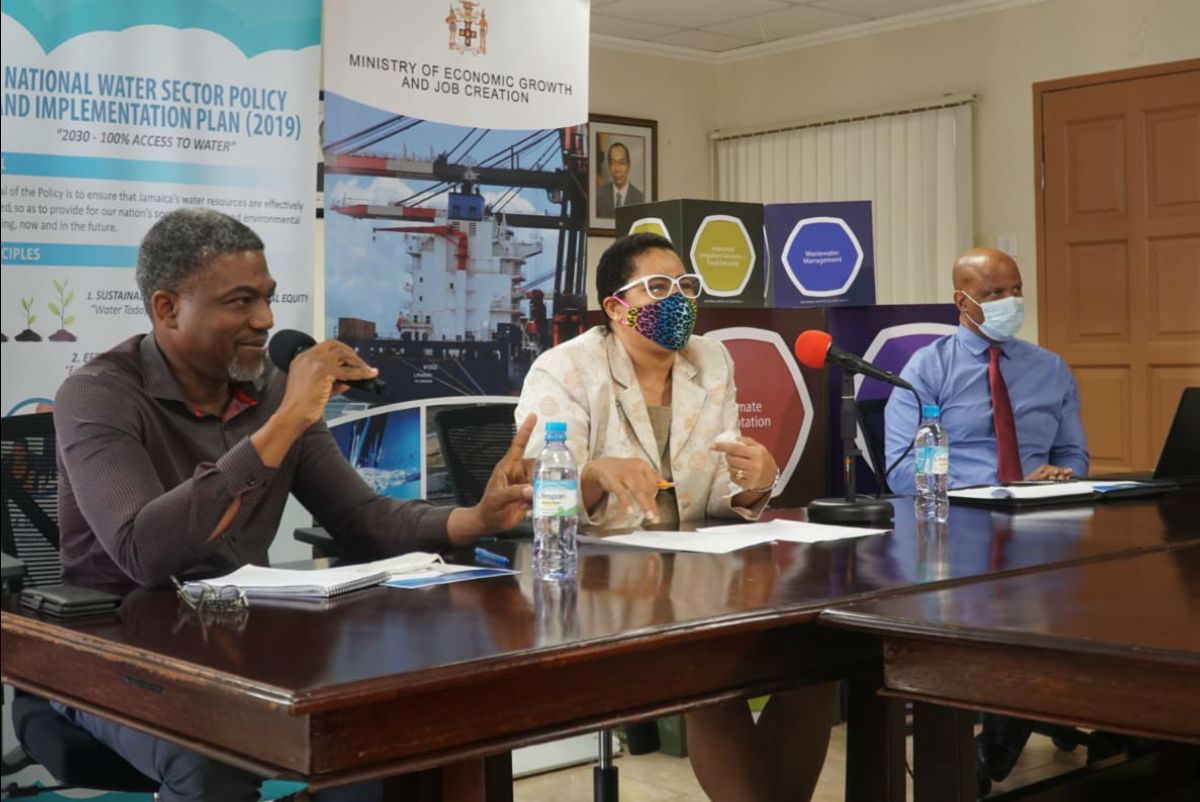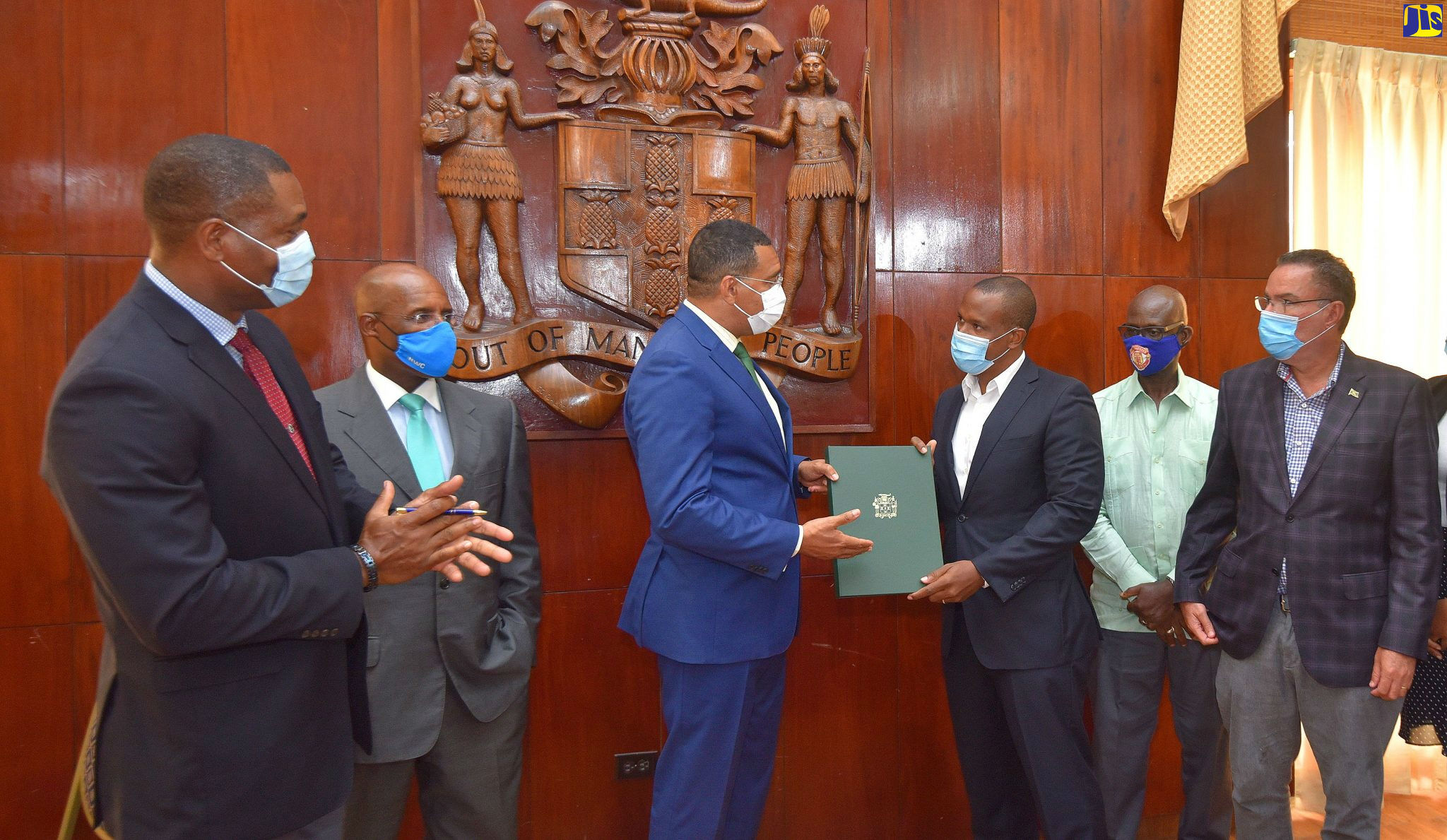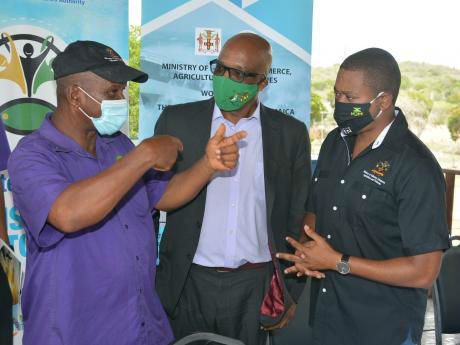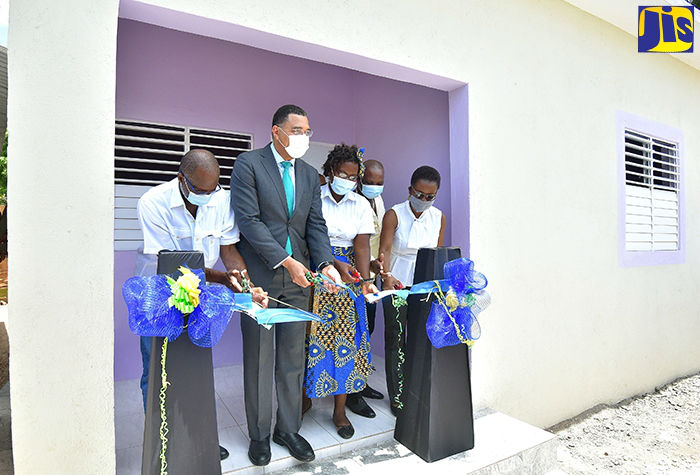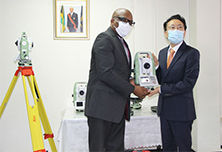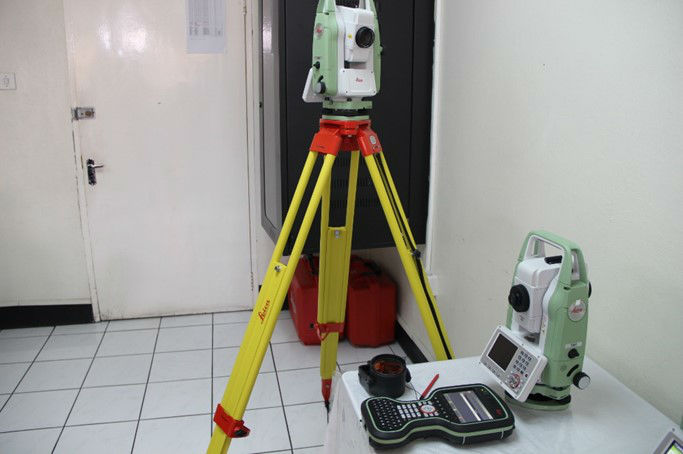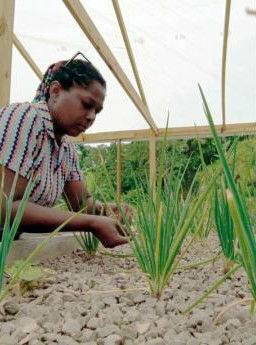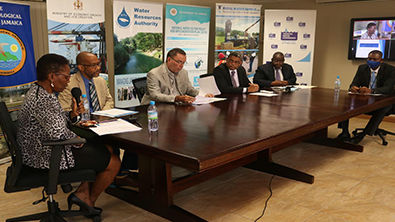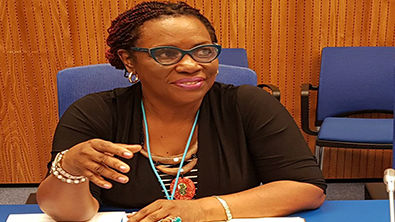 The Ministry of Economic Growth and Job Creation this morning (Tuesday, Sept 22), hosted a virtual information session on water and health in keeping with the measures outlined in the National Water Sector Policy and Implementation Plan 2019. L-R: Mr Michael Williams, Environmental Health Specialist, Ministry of Health and Wellness; Ms Talia Gibson, Acting Director, Water Policy and Monitoring Branch, MEGJC and; Mr Anthony McKenzie, Director, Environmental Management and Conservation, NEPA. The Ministry of Economic Growth and Job Creation this morning (Tuesday, Sept 22), hosted a virtual information session on water and health in keeping with the measures outlined in the National Water Sector Policy and Implementation Plan 2019. L-R: Mr Michael Williams, Environmental Health Specialist, Ministry of Health and Wellness; Ms Talia Gibson, Acting Director, Water Policy and Monitoring Branch, MEGJC and; Mr Anthony McKenzie, Director, Environmental Management and Conservation, NEPA. |
| The Ministry of Economic Growth and Job Creation this morning (Tuesday, September 22) outlined the Standards for Access to Potable Water Supply and Improved Sanitation as stated in the National Water Sector Policy and Implementation Plan 2019 (NWSP). The measure was outlined during a virtual information session held under the theme, Water and Health. Acting Senior Director, Water Policy and Monitoring Branch within the Ministry of Economic Growth and Job Creation (MEGJC), Ms Talia Gibson says the “Policy specifically speaks to Standards for Access to Potable Water Supply and Improved Sanitation and seeks to achieve several service targets”. She explained all households will have access to potable water supply by 2030. This means that the water supply will be: Safe—Potable water will conform to standards set by the Ministry of Health and Wellness (MOHW) and the World Health Organization (WHO); Convenient—Water supply will be delivered to the home, or as close as possible. Water supply should be no more than 500 metres from the home; Of sufficient quantity—Each person will have access to at least 50 litres per day; Reliable— Water supply will be available 24 hours per day, or otherwise on a predictable schedule; and Affordable— Pricing for water will continue to be arrived at by consultation with stakeholders. No one will be denied access to potable water because of an inability to pay. Ms Gibson added that for sanitation “cities and major towns will have sewerage services provided by a utility company. Where sewerage service is not economically feasible, all new developments will have access to safe and environmentally friendly sanitation solutions, which will preserve the privacy and dignity of users. Standards for non-sewerage areas will be established and enforced by the National Building Code, MOHW Regulations, stipulations by the Municipal Corporations and Local Authorities, and National Environment and Planning Agency (NEPA) guidelines”. Presentations were made by Mr Michael Williams, Environmental Health Specialist, Ministry of Health and Wellness and Mr Anthony McKenzie, Director, Environmental Management and Conservation, NEPA. The National Water Sector Policy and Implementation Plan 2019 was tabled in the Houses of Parliament in July 2019. The Policy aims to guide the provision of universal access to potable water and adequate sanitation by 2030. –30– |
Category: News
Earth Today | White River Fish Sanctuary Ready For Conservation, Ecotourism Boost
WITH THE official opening of office space for the White River Fish Sanctuary in St Ann and now three years in operation, the stage seems set for its enhanced contribution to sustainable fishing and ecotourism.
“What today’s launch of the White River Fish Sanctuary represents is sustainable tourism, where we take a holistic approach to the sector’s current and future economic, social and environmental impacts,” noted Minister of Tourism Ed Bartlett, speaking at the opening on August 13.
“In taking this holistic approach, we are also addressing the needs of visitors, the industry, the environment and communities, and building meaningful public-private sector partnerships,” he added.
“Though I am no marine biologist, the data also highlight that with the establishment of the fish sanctuary, we will see an increase in the population of fish in our waters that will be beneficial for livelihoods and help restore our reefs,” he said further.
The operation of the fish sanctuary has been made possible, in part, through a partnership, valued at some J$15 million, between the Tourism Enhancement Fund and the White River Marine Association (WRMA).
Among other things, the partnership has seen the construction of the new office, together with the employment of fishermen as sanctuary wardens, and the purchase of enforcement and other equipment.
“The main objective of the wardens is to stop all fishing or the taking of any live organisms from within the sanctuary. With this new source of alternative income for the fishermen, we are excited to be supporting the livelihoods of many members of the community until sustainable fishing returns,” noted Kyle Mais, director of the WRMA.
The sanctuary also employs an accounting administrator, a manager, and a marine biologist.
Meanwhile, operations of the sanctuary have also seen five coral nurseries set up since June 2017 to grow 1,400 pieces of staghorn and elkhorn corals as part of a five-phase, five-year programme funded by a grant from the Special Climate Change Adaptation Fund.
Already, more than 700 pieces of coral have been planted, and the nurseries reseeded with the corals which show resilience to the bleaching events.
“These direct and indirect benefits of launching the sanctuary also speak to the rich value chain that tourism offers when linkages are strengthened. What this means is that many people along the value chain will benefit from this project,” the minister said.
“From our reports, there has also been an increase in the number of glass-bottom boats seen within the sanctuary that use the coral nursery as an attraction and also to educate tourists. As is being displayed through this project, tourism can be linked with national poverty-reduction strategies by providing income through job creation and facilitating entrepreneurial development at the local and community levels,” Bartlett said.
“We can also attest to the fact that greater engagement between tourism and local communities can also help protect or revive our natural assets and intangible cultural heritage. As this sanctuary grows and flourishes, so will the community and, ultimately, tourism activities surrounding it,” he added.
Stakeholder Collaboration
Mais has urged collaboration between existing and new stakeholders for the continued work of the sanctuary, particularly given the reality of the COVID-19 pandemic.
“Organisations like the White River Fish Sanctuary are rapidly facing a critical threat from this pandemic, due to funding constraints which risk forcing us to downsize and lay off staff at the precise moment when our work has become vitally important,” he said.
“Responding to the COVID-19 pandemic requires even greater cooperation among government agencies, local and international organisations and the business community, which is at the centre of the White River Fish Sanctuary fundraising mission for public-private cooperation,” he added.
Contract Signed To Improve Water Supply Between Six Miles And Blake Road In Kingston
The Government has signed a contract valued at US$25 million for a transmission main upgrade that will improve the water supply between Six Miles and Blake Road in Kingston.
Prime Minister, the Most Hon. Andrew Holness, signed the contract today (August 12), at Jamaica House. Also signing were Minister without Portfolio in the Ministry of Economic Growth and Job Creation, with responsibility for Water and Housing, Hon. Daryl Vaz; and Director, M & M Jamaica Limited, Richard Mullings.
Prior to the contract being signed, the Prime Minister gave a breakdown of the project.
“This project will connect to the pipe that we already laid along the Mandela Highway. It will……..Read More
US$4.8M Climate Resilience Fisheries Project Launched
More than 40,000 local fisheries stakeholders are poised to benefit from the implementation of the ‘Promoting Community-based Climate Resilience in the Fisheries Sector Project’ by the Ministry of Industry, Commerce, Agriculture and Fisheries (MICAF).
The US$4.875-million five-year World Bank-funded initiative aims to enhance climate resilient practices among targeted fishing and fish-farming communities across Jamaica in a bid to strengthen the sector through several engagements.
These include investment and diversification in fisheries-based alternatives; development of climate resilient fisheries and aquaculture polices and regulations; building awareness on more climate and disaster resilient fisheries and aquaculture practices; and increased sensitisation of climate change, among other crucial measures, for a sustainable fisheries sector.
The project was launched by Minister without Portfolio Leslie Campbell during a ceremony at the Treasure Beach Sports Park in St Elizabeth, on July 24.
Campbell, who expressed the Government’s appreciation for the World Bank’s ongoing support, reaffirmed the Administration’s commitment to providing the fishing industry with the necessary inputs to ensure its sustainability.
“We recognise the critical and important role being played by the fishing industry in creating livelihoods for fishers throughout the country and the unlimited potential it possesses to significantly contribute to the development of the national economy,” he said.
Campbell noted that over the past two years, the sector contributed US$79 million to Jamaica’s gross domestic product (GDP), with exports totalling more than one tonne, adding that he anticipates “great success” from the project that will further enhance the industry.
For his part, Minister of State in the Ministry of Industry, Commerce, Agriculture and Fisheries, Floyd Green, said he was happy that the initiative will foster greater climate change resilience across the sector.
He pointed out that there is indisputable evidence that climate change is “all around” and as such “nobody has to convince us about [it]”.
“What we have to do is be equipped with the tools to adequately respond so that our fisheries sector can survive.
We want to ensure that for generations to come, we can celebrate a robust fishing industry,” Green added.
Chief Executive Officer of the National Fisheries Authority, Courtney Cole, in his remarks, noted the entity is looking forward to the project’s successful implementation.
Government to Launch Design Competition for Housing Solutions
The Government is set to launch a design competition for housing solutions across the island.
The announcement was made yesterday (July 30) by Prime Andrew Holness while speaking at the Handing over ceremony for social housing at Moore Pen Old Harbour Bay, St. Catherine.
Prime Minister Holness said his Government……Read More
NLA receives Cadastral mapping and land registration support
Charge d’ Affaires of the Embassy of the Republic of Korea, Lim Baejin last Thursday, July 16, 2020, handed over several pieces of equipment to the National Land Agency (NLA) to support Cadastral Mapping and land registration across the island.
Minister without portfolio in the Ministry of Economic Growth and Job Creation (MEGJC), Hon. Leslie Campbell who was on hand to receive the items valued at US$92,903.58, expressed his gratitude on behalf of the Government and people of Jamaica.
The items which were handed over at the NLA’s Estate Management Division on North Street, Kingston included three Leica TSO7 Total Stations, three Leica CS20 Field Controllers; and one Leica GS16 GNSS Rover kit as well as the peripheral accessories that were all procured through the Korean International Co-operation Agency (KOICA).
Minister Campbell who has responsibility for Land, Environment and Climate Change at the MEGJC told the Charge d’ Affaires that the equipment represents a much- needed injection of new technology in land surveying in Jamaica.
“It will take Cadastral mapping at the NLA to new levels, generating improved efficiency in land surveying and land registration activities. I am delighted to know that this will positively impact the delivery of the targeted 20,000 new Certificates of Title by the Government,” he said.
The Chargé d’Affaires, in turn, said the equipment will facilitate post-project management support for the registration of lands in Jamaica.
Minister Campbell added that Jamaica has had a productive partnership over the past eight years in Cadastral mapping with the financial and technical support of the Government of the Republic of Korea through the KOICA.
“Special thanks to the representatives of the Embassy of the Republic of Korea, who worked along with the local team from the Ministry of Foreign Affairs and Foreign Trade, the National Land Agency and the Ministry of Economic Growth and Job Creation to successfully procure and deliver this well-needed equipment. We look forward to the continued cooperation between our two countries,” Minister Campbell said.
The Land Administration and Management Programme (LAMP) was subsumed in the National Land Agency to benefit from synergies and to accelerate land registration in Jamaica. The merger was completed in March 2019. Systematic land registration is being pursued whereby certain areas will be designated to be surveyed and land adjudication undertaken with a view to having the parcels of land therein registered.
The GOJ has targeted the delivery of 20,000 new Certificates of Title over three years. This activity commencing in 2019.
–30–
Earth Today | Climate-Smart Aquaponics Farming Appeals To Local Teacher
Margaret Lothian is a teacher of 31 years who is now contemplating a career change, following her recent involvement in a community project on aquaponics farming.
“I’ve been acting as vice-principal for the past two years. I have been in teaching for almost 31 years, and right now I would leave it to do aquaponics farming full- time,” said Lothian, who teaches at Aenon Town Primary in Clarendon.
She is one of several community members who have been participating in an aquaponics project funded by the Adaptation Programme and Financing Mechanism (AP&FM) Project of the Pilot Programme for Climate Resilience (PPCR). The AP&FM is administered by the Ministry of Economic Growth and Job Creation, with funding from the Climate Investment Funds through the Inter-American Development Bank.
The Aquaponics Farming Project is operational in five rural communities: Aenon Town, Ritchies, Alston, Johns Hall, and James Hill in the Upper Rio Minho Watershed Area of Clarendon. The five communities have a combined population of over 10, 333 persons and are operating their new aquaponics systems through community development committees.
“Aquaponics is an innovative farming technique that combines aquaculture (fish farming) with hydroponics (soil-less crop production). It is a method that boosts crop production up to 10 times higher than traditionally cultivated plots of equivalent size.
It uses 85-90 per cent less water and no chemical fertilisers or pesticides. It uses low energy consumption, providing year-round crop production and calls for much less labour than traditional farming, making it much more attractive for vulnerable groups such as persons with disabilities.
The aquaponics project started in December 2018 and is part of the activities undertaken to reduce Jamaica’s vulnerability to climate change.
Even before COVID-19, the island has been experiencing impacts, such as stronger hurricanes, severe flooding, prolonged droughts and sea level rise. Between 2001 and 2012, Jamaica experienced 11 storm events (including five major hurricanes) and several flood events, amounting to loss and damage of some J$128.54 billion.
Some of the new systems are recently completed, but already, farmers have reaped crops and sold at farmers’ markets, Lothian said. The options for marketing are many.
NOT WITHOUT CHALLENGE
“We have ALEX (a Government of Jamaica-run project to distribute fresh farm products); there is the farmers’ market; and other options are available to us,” noted Lothian.
“The successful planting out of our grow beds with different crops such as pak choi, cucumber, scallion, strawberry and tomato; raising the fish and watching them grow from fingerlings to sizes including quarter-pound; successfully reaping and selling crops; and getting community persons involved in the project,” the teacher added, noting what she considers project achievements to date.
Still, the aquaponics project is not without its challenges. Lothian pointed to praedial larceny, farmers needing water to keep the system going, and the difficulty of finding time to spend on the farm as being among them.
However, with so many opportunities available to market the output, the teacher is thinking of making a career switch so she can have more time.
“Aquaponics farming is a great way to farm. The impact on the lives of individuals is significant as they have learnt a climate-smart way to grow crops without destroying the environment. It offers a fast income, and it’s not as taxing on the body as farming in the grounds,” she said.
“Aquaponics has been helping us to adapt to climate change. This system does not use as much chemicals as regular farming does, and whatever is used on the crops has to be safe for the fish. There is no need to slash and burn and release harmful substances into the atmosphere. The system also uses less water than regular farming as the water is recycled,” she added.
Bill tabled to amend the Special Economic Zones Act
Minister Without Portfolio in the Ministry of Economic Growth and Job Creation (MEGJC) Hon. Daryl Vaz recently presented the Bill entitled, An Act to Amend the Special Economic Zones Act, to the House of Representatives for its consideration.
Minister Vaz told the House that steps have been taken to have an integrated framework in place for the Special Economic Zones regime, for which the Special Economic Zones Act was passed in January 2016 and made effective in August 2016, and the Special Economic Zones Regulations, more recently Gazetted in September, 2017.
Minister Vaz was making his contribution to the Parliamentary Debate on July 6, 2020.
He recalled that when the Act was first passed ‘Minister’ was defined at section 2 as the Minister with portfolio responsibility for Industry and the Act went into effect with the same portfolio designation.
“On this Administration taking over, the regime was placed under the portfolio of the Minister with responsibility for Special Economic Zones, which is the Ministry of Economic Growth and Job Creation,” he explained.
He further explained that for continuity and technical accuracy, in December 2017 section 2 was amended by deleting the definition of ‘Minister’.
“Consequent on this deletion the references to the word ‘Minister’ as used throughout the Act, are now interpreted as an operation of law based on the Interpretation Act,” he said.
He told the Honourable House that it is on the basis of ensuring continuity and technical accuracy throughout the Act that “we now take the Bill to amend Part II of the Third Schedule of the Act by deleting paragraph 1(1)(b) to reflect the change in portfolio responsibility from the Minister with responsibility for Industry to the Minister responsible for Economic Growth and Job Creation.”
He noted that the paragraph currently provides that:
(1) The Board shall consist of – (b) “A senior public officer in the Ministry responsible for industry, nominated by the Permanent Secretary in the Ministry responsible for industry, who shall be the members ex officio:”
The amendment tabled now reads:
“(b) a senior public officer in the Ministry responsible for Special Economic Zones, nominated by the Permanent Secretary in the Ministry responsible for Special Economic Zones, who shall be a member ex officio;”.
Special Economic Zones are geographically demarcated areas within countries for investment attraction of value-added production and services which benefit from fiscal incentives.
Water Agencies step up Drought Initiatives
The Meteorological Services Branch (Met Service) and the National Water Commission (NWC) along with other key Agencies in the Water Sector have stepped up their efforts this year to strengthen the country’s response to drought management.
According to Minister Without Portfolio in the Ministry of Economic Growth and Job Creation (MEGJC) Hon. Daryl Vaz, the Met Service which is responsible for sounding an alarm when meteorological drought conditions are expected or are being experienced, has put in place plans to increase coverage of automatic weather stations by another 15 per cent during this financial year 2020/2021.
Minister Vaz who has responsibility for the Water and Housing portfolios, was speaking at a virtual press briefing that was convened at the Ministry’s New Kingston offices recently, to update the nation on the water initiatives that are currently being undertaken by the island’s key water agencies, as well as their individual and collective response to the yearly drought experienced by the country.
Minister Vaz explained that the Met Service currently monitors a network of 103 manual rain-gauges, four (4) rainfall intensity gauges and 100 automatic weather stations across the length and breadth of the island. He noted that this is still short of the number required to give complete coverage of all 14 Parishes “but does provide very good representation of wet and dry conditions being experienced around the country to varying degrees”.
In explaining the need for the installation of the automatic weather stations, Minister Vaz said there is capacity at this time to relay rainfall information in real-time by only about 10 per cent of the automatic network.
However, he said by this time next year, this will be possible from over 90 per cent of the stations, allowing for drought determination in a much more timely manner.
In keeping with the mandate of the National Water Sector Policy and Implementation Plan (2019), the National Water Commission (NWC) in the meantime has stepped up its efforts to ensure access to potable water through the installation of several major pipelines and other infrastructure to improve supply to several communities across the Corporate Area.
Minister Vaz says the installation of these pipelines are not only important to the NWC’s comprehensive plans for efficient distribution of the commodity, but are also part of broader efforts to build resilience and reliability within the network.
The Water Resources Authority (WRA) among its several initiatives has improved its capacity to determine the amount of water that is available in the island especially during the drought period. This includes the upgrade/maintenance of 15 new and existing river gauging stations.
Minister Vaz said this programme will allow for improved data capture that will enhance analysis and recommendations that are critical to the Development Approvals Process, the applications for abstraction and for charting responses to weather and climate extremes such as floods, droughts and climate change.
In the meantime, the Rural Water Supply Limited (RWSL) has approached the water challenges through the Rural Water Upgrading Programme; catchment tank rehabilitation; and the provision of rainwater Harvesting facilities, particularly in schools.
–30–
Updated NDC receives Cabinet approval as Jamaica seeks to increase climate action
Jamaica’s updated Nationally Determined Contribution (NDC) has received approval from the Cabinet and has been uploaded to the NDC Registry of the United Nations Framework Convention on Climate Change (UNFCCC).
Under the terms of the Paris Agreement, which Jamaica ratified in 2017, countries are expected to periodically prepare Nationally Determined Contributions, (NDCs), which symbolize the actions countries are taking to reduce greenhouse gas emissions and enhance carbon sinks to help reach the temperature goal of the Agreement.
Jamaica has taken several steps to broaden its ambition in two key sectors, Energy and Forestry, to reduce its carbon footprint and address the challenge of Climate Change.
This reflects the importance of the forestry sector to Jamaica, which accounts for more than half of the island’s total land use, and the important commitments that the country has made to preserve and enhance its forest stocks.
During a global NDC stakeholder briefing, convened by the Climate Change Division, it was disclosed that 17 per cent of the emission reductions are expected to come from the forestry sector due to the ‘No Net Loss of Forestry’ commitments and the current initiative to plant 3 million trees.
The country has also identified opportunities to deepen the emission reductions, based on projects, programs, and new initiatives in the energy sector. These opportunities are part of an increasingly comprehensive approach to de-carbonizing this sector that covers both the electricity generation, as well as energy use sub-sectors.
The result of these positive changes is that Jamaica’s climate targets will be significantly more ambitious.
By 2030, it foresees emission reductions covering these two sectors of between 25.4 per cent (unconditional) and 28.5 per cent (conditional).
This implies that emissions in these sectors would be 1.8 to 2.0 Metric Tonnes Carbon Dioxide Equivalent (MtCO2e) lower, than they otherwise would be, compared with 1.1 to 1.5 MtCO2e in the previous NDC.
The updated NDC has also taken adaptation into consideration with several environmental and resilience-based co-benefits expected to be achieved when the NDC is fully implemented.
As a Small Island Developing State, the physical risks of climate change are a particular threat to the development, wellbeing and economic security of Jamaica and its citizens.
–30–


